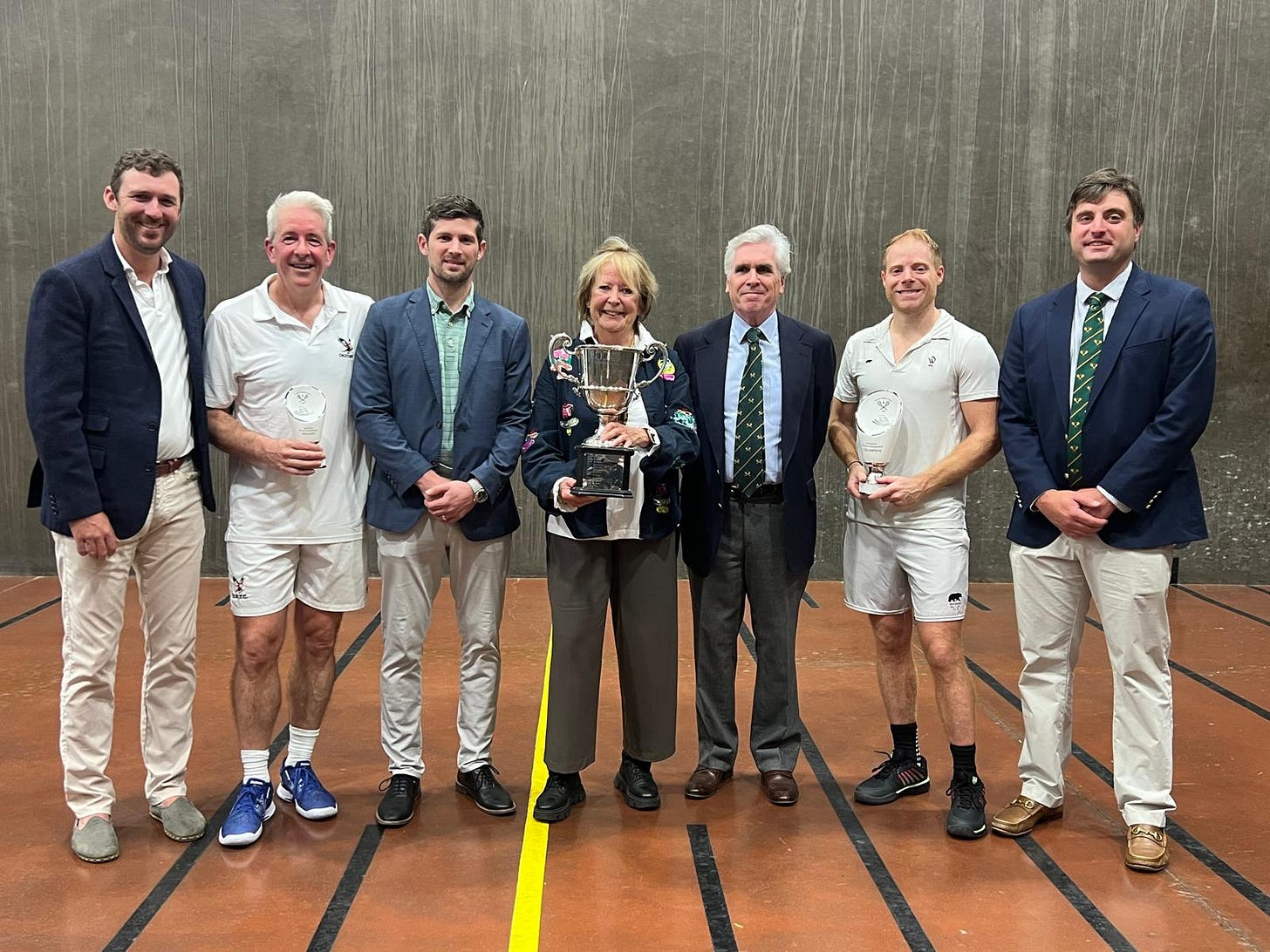King Camden rules Carolina with IRTPA Players' Championship victory
Riviere records largest career margin of victory over Fahey
Camden Riviere has become the first player in six years to win the IRTPA Players’ Championship, with a dominant straight-sets victory over Robert Fahey in the final at the Aiken Tennis Club on Sunday.
Despite being the 49th chapter of the Robert Fahey & Camden Riviere saga,1 it was a day of firsts. It was the first time the IRTPA Players’ Championship would be determined in Aiken, the first time they had met in a final since Fahey’s retirement, and the first time the two have gone into battle competitively on Riviere’s childhood court — having only played at Fahey’s alma mater in singles for the first time earlier in the year as well. Just as they had done all week, the Aiken members filled the galleries, with standing room only to see their favourite son do battle against the man he had fought five World Championships against.
From the start, Fahey was unable to get his cut-volley away, dumping several of Riviere’s left-handed railroads into the net. From the service end, Fahey was serving underarm twists, which Riviere was choosing to let fall and either turn or step inside onto the forehand. Fahey quickly grew tired of Riviere’s insane retrieving ability, and once he was behind on the scoreboard he began reaching deep into his Mary Poppins-esque bag of tricks to try and catch Riviere out, be it funky spins or tickled boasts. Riviere looked slightly bewildered at Fahey’s antics but was not shaken from his plan A, driving forehands for the dedans where possible and otherwise out-rallying Fahey on the floor. Over the course of the set, the scoreboard snowballed in Riviere’s favour, winning without dropping a game.
Fahey won his first game at the beginning of the second set. He was trying to turn the Aiken crowd against Riviere, pulling out some strange and impressive gets. Riviere, so used to being cast as the villain when playing Fahey, didn’t seem to know what to make of it. Riviere’s winners were met with polite applause compared to the cheers for Fahey. One point saw Fahey charge the winning gallery, and having struck the ball remain static, leaving the entirety of the court open for Riviere. But Riviere only spooned it back directly at Fahey, allowing him back into the rally. Nonetheless, Riviere quickly settled back into his rhythm, showing why he is still arguably the only person in history with the ability to make Fahey look human.
Riviere’s dominance continued going into the third set, unfazed by Fahey sending constant, difficult balls into both corners and happy to scoop them back time after time before getting a shot away at an opening. Slowly, Riviere turned the crowd back to his side, fully starting to appreciate the masterclass on show in front of them. By the third set, Fahey’s movements were smaller, often not more than a couple of steps in either direction as Riviere fed the ball back into the middle. But even so, he couldn’t find much to do with it as Riviere had both his force and his cut shot covered. Riviere won the final set easily.
It was Riviere’s first tournament victory at Aiken in 8 years, and his largest victory margin over Fahey in his career, beating the two games Fahey won in the 2016 French Open final. It was also his fifth victory in the event, and the first since 2017.
“It is so cool to get to play in Aiken, my hometown, in front of all of you, and have all of the top 20 players in the world come to town and showcase what we all know to be such an amazing place,” said Riviere, “to have the opportunity to bring these guys down here and show off Aiken and our beautiful city has been amazing.”

The next major event will be the British Open in November, with the draw set to be conducted in the coming week.
Match results:
12:30 PM: Camden Riviere (1) def Robert Fahey 6/0 6/1 6/0
Note: Yesterday’s article got the order of the two semi finals the wrong way around. Real Tennis News apologies for any confusion! It also incorrectly stated the number of matches played between the two players, stating instead the number of finals played between them.
Singles matches. Not including the 2009 Moreton Morrell Pro-Am.


